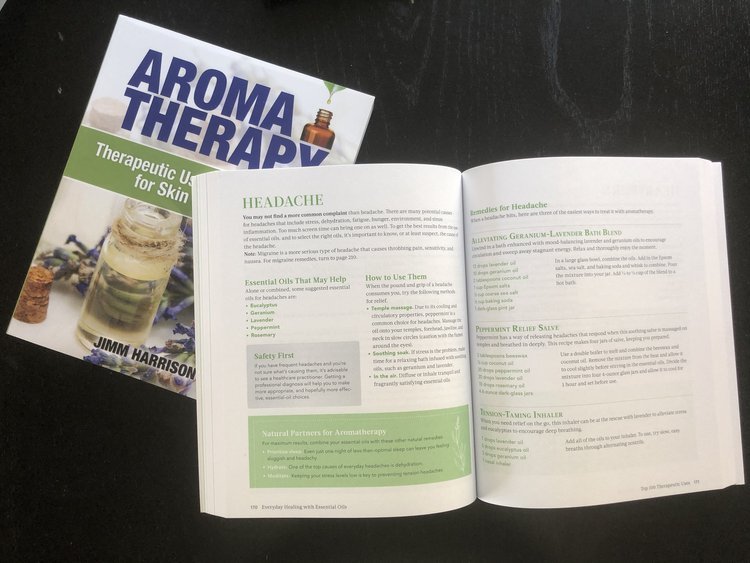Make Them Yours: The Essential Oil Philosophy
Essential oils are volatile lipid substances derived from plants having therapeutic properties for physical and emotional wellbeing.
Sure they are. And?
They help relieve stress, anxiety, and bring balance to emotions.
Ok, and?
They correct many health conditions such as headache, digestive issues, respiratory illness, pain and inflammation.
Go on.
Essential oils are excellent in skin care, preventing and reducing wrinkles, are balancing, purifying, detoxifying and help eliminate acne.
Anything else?
Yes, there’s an oil for everything, and all you have to do is smell them or apply them to your body.
Is it really that easy?
Yes, well, no. Maybe, it depends. Let’s just say, when they do what you want them to do, they work. When they don't do what’s expected, they don’t work.
How do you know when they will work and when they won’t?
Just use them. And, the more you learn about the oils and have a relationship with them, the more chance of them doing what’s expected when used for specific reasons.
Sounds like nonsense.
Yes it does, but, it’s an accurate description.
Make it stand out
Rather than continue to pound square essential oil facts into a round hole, the suggestion here is to create a philosophy.
The point of that conversational flow was to set-up and make obvious that essential oils are an incredibly effective healing tool, are often misunderstood or misinterpreted, and are a bit edgy and mysterious - and can appear rather ridiculous to those outside the aromatic church. Attempts to explain or define essential oils is further complicated by those who use and study them and, due to a cultural demand, attempt to box aromatherapy up nice and neat, whether the information or logic used is accurate or not.
Rather than continue to pound square essential oil facts into a round hole, the suggestion here is to create a philosophy. A philosophical approach; meaning to use thinking, reasoning, wisdom, knowledge, theoretical, analytical, logical, metaphysical, and esoteric analysis; takes a more creative and intuitive approach to the information available and incorporates this into a personal definition and use of essential oils and aromatherapy. Don’t get me wrong here, I’m not suggesting that you just make it up as you go along. Especially since that’s basically what’s already happening with so much of the translation of facts and data, a situation of repeating a lie enough times it becomes the truth (in this case repeating incorrect information or misinterpreted data). Curiously interesting with essential oils, is that sometimes making it up and repeating actually does create a truth.
This isn’t about changing or making up facts. A philosophy of essential oils is primarily about how to use the facts. It becomes very subjective and personal. An MD who would like to use essential oils as part of a medical practice requires information geared toward a medical practice. The same information can, and is, used by an ND, a massage therapist, an esthetician, a mother, a father, a gardener or a poet, where each will have a very different way of using the information.
The “facts” each used to support their choices may be exactly the same, it’s the educational background, intellect, spirituality and the philosophical differences that will change how each makes oil and application decisions.
How scientific analysis and empirical data is incorporated into an essential oil practice should resonate with the individual. An ND will select essential oils for stress based on the techniques and knowledge that works within their professional training, where a parent or esthetician would choose oils and applications for stress based on their own strategies for healing. The “facts” each used to support their choices may be exactly the same, it’s the educational background, intellect, spirituality and the philosophical differences that will change how each makes oil and application decisions. The caveat here is that no matter your philosophy, there is extreme value to well-rounded and comprehensive education and experience for effective use of essential oils. With so much contradiction in the literature and online sources, as well as the inaccurate translation of the data, a philosophy of use becomes a legit way to work around the confusion.
This may sound weird (that’s aromatherapy for you), but a seemingly inaccurate or off-base practice or protocol that’s been shown to work effectively for the individual using it, still works! If the practice consistently shows results, or results best expected from essential oil use, it makes no sense to point at the flaws in the scientific reasoning. If shit works, it works! The weakness shows when this individual tries to convince others (or worse, writes a book or blog) that their scientific basis is factual because, hey, it worked. This is how misinformation gets started and why the essential oil world is loaded with it. Even those beautiful peer-reviewed scientific journal studies are limited due to the conditions that are often unrepeatable in real world (human) conditions. I don’t want to take anything away from a decent study, its the interpretation that’s the culprit of misinformation, or disinformation when presented by some essential oil brands.
What’s a good essential oil philosophy? I don’t know. It’s yours to find and create. The message here is to forgo a “correct” use of essential oils and develop your own strategies of selection and application, and even evaluation methods. Learn what’s out there, what experts and longtime users have done and say. Then leave behind what doesn’t resonate with you. I say let go of correct info that doesn’t resonate, but that doesn’t mean ignore solid facts or use incorrect methods. There are, quite frankly, very stupid, wasteful and illogical instructions for use coming from all directions. Don’t do those things. Unfortunately for the novice, how to know the difference between the lame, silly and out-right wrong from the factual and logical can be a challenge. Yeah, we all have to go through that.
The philosophical approach allows for flexibility. Take notes, journal or whatever helps you to remember, advance and proceed with an efficacious aromatherapy practice. You’ll find you are often breaking repeated rules and ignoring repeated so-called truths. It’s all good. Your philosophy shouldn’t ignore these repeated rules and truths, until at least you’ve tried out or did some research on your own. It’s your philosophy and your way of translating the diverse and complicated world of essential oil knowledge and practice. Keep in mind, the oils know their way around. A good practice and philosophy takes this into consideration, even though we don’t know the essential oils still do.


